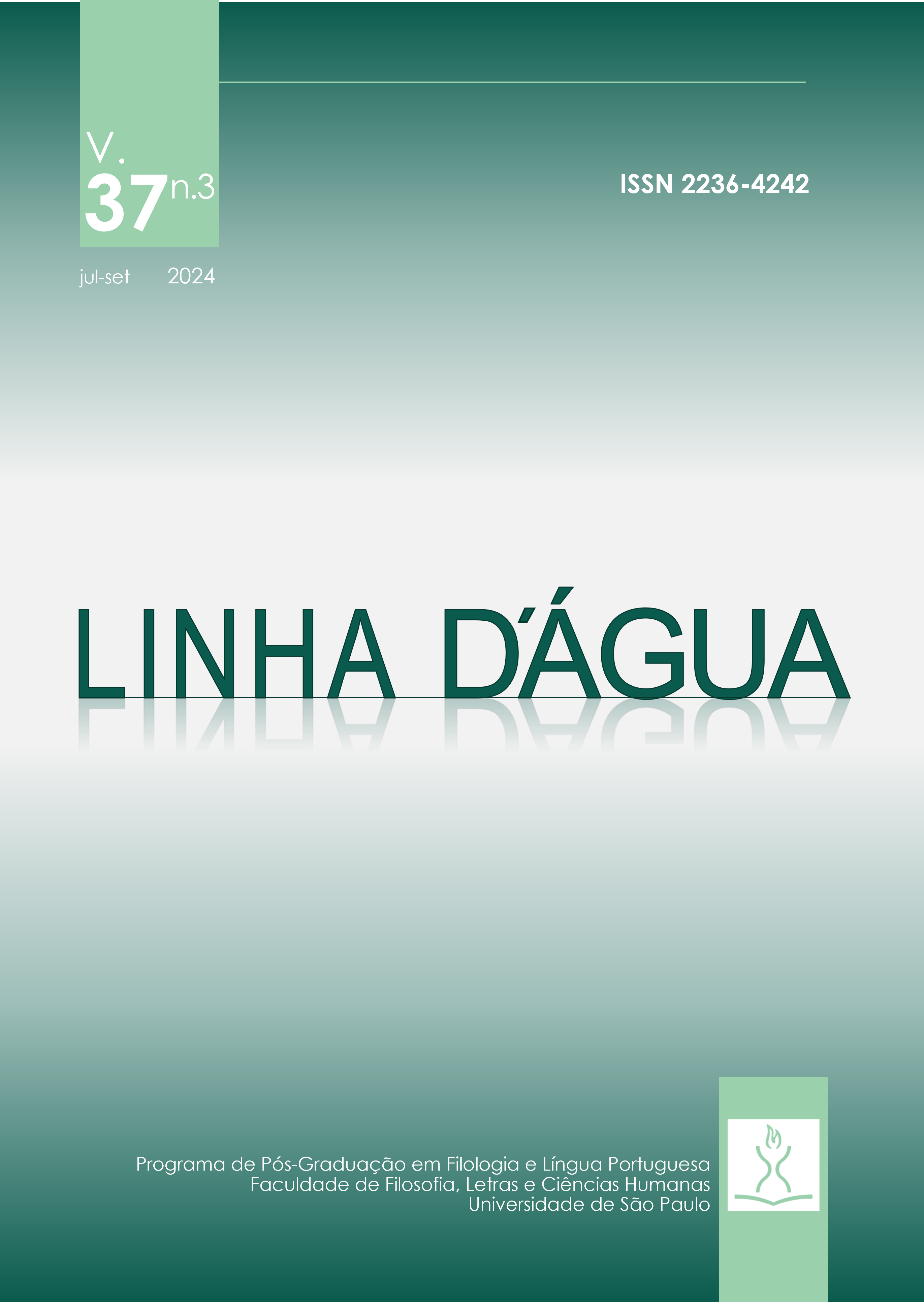A discursive-spectacular fusion of politics, media and religion in Brazil’s 2018 presidential campaign
DOI:
https://doi.org/10.11606/issn.2236-4242.v37i3p132-150Keywords:
Discursive fusion, Spectacle, Scene of enunciation, Election campaign, Discursive fieldsAbstract
The main objective of this article is to correlate the theoretical assumptions of enunciative Discourse Analysis and Guy Debord’s (1997) work on the social spectacle, through the proposal of a discursive-spectacular fusion between the political, the media and the religious, in the 2018 election campaign led by the party coalition “Brazil above everything, God above everyone”, composed of the Social Liberal Party (PSL) and the Brazilian Renewal Labor Party (PRTB). The aim is to demonstrate, from Debord's perspective (1997), the profound relationship between capitalism and social spectacle, understood as relations mediated by images. It also seeks to associate social spectacle and the scene of enunciation, a notion that recovers the process of representation of the very situation of speaking, through the discursive constitution of the enunciative instances: the enunciator/co-enunciator pair and the coordinates of time and space of enunciation. In addition, a proposal for analyzing the corpus is presented, which consists of highlighting, in the verbal-visual materiality, the traits that show the discursive functioning that is presented as the hypothesis of this research: a discursive-spectacular fusion between discourses that circulate in the political, media and religious fields, specifically.
Downloads
References
DEBORD, Guy. Commentaires sur La société du spectacle. In: Œuvres. Org. J.-L Rançon. Paris: Gallimard, 2006[1988].
DEBORD, G. A sociedade do espetáculo: comentários sobre a sociedade do espetáculo. Trad. Estela dos Santos Abreu. Rio de Janeiro: Contraponto, 1997.
FERGUSON, E. História da Igreja volume 1: dos dias de Cristo à Pré-reforma, a ascensão e o crescimento da Igreja em seus contextos cultural, intelectual e político. Trad. Elias Silva et al. Rio de Janeiro: Central Gospel Ltda, 2017.
FREDERICO, C. Debord: do espetáculo ao simulacro. Matrizes, v. 4, n. 1, p. 179-191, 2010. Disponível em: https://www.redalyc.org/pdf/1430/143016764011.pdf. Acesso em: 05 ago. 2021.
MAINGUENEAU, D. Ethos, cenografia e incorporação. In: AMOSSY, R. Imagens de si no discurso: a construção do ethos. 2.ed. Trad. Dilson Ferreira da Cruz, Fabiana Komesu e Sírio Possenti. São Paulo: Contexto, 2016, p. 69-92.
MAINGUENEAU, D. Discurso e análise do discurso. Trad. Sírio Possenti. São Paulo: Parábola Editorial, 2015.
MAINGUENEAU, D. Análise de textos de comunicação. Trad. Cecília Perez de Souza-e-Silva e Décio Rocha. 6.ed. São Paulo: Cortez, 2011.
MAINGUENEAU, D. Gênese dos discursos. Trad. Sírio Possenti. São Paulo: Parábola Editorial, 2008.
MAINGUENEAU, D. Discurso literário. São Paulo: Contexto, 2006a.
MAINGUENEAU, D. Cenas da enunciação. Trad. Maria Cecília Pérez de Souza-e-Silva et al. Curitiba: Criar Edições, 2006b.
MAINGUENEAU, D. Novas tendências em análise do discurso. 3.ed. Trad. Freda Indursky. Campinas, SP: Pontes: Editora da Universidade Estadual de Campinas, 1997.
PECCININ, L. E. O discurso religioso na arena política: representação e deliberação democrática no Estado laico. 180f. Dissertação (Mestrado). Universidade Federal do Paraná, Curitiba, 2016. Disponível em: https://www.acervodigital.ufpr.br/bitstream/handle/1884/42896/R%20-%20D%20-%20LUIZ%20EDUARDO%20PECCININ.pdf?sequence=1&isAllowed=y. Acesso em: 30 mar. 2021.
RAMOS, L. C. A sociedade do espetáculo e o discurso religioso. Caminhando, v. 13, n. 2, p. 141-154, 2008. Disponível em: https://www.metodista.br/revistas/revistas-ims/index.php/Caminhando/article/view/1055. Acesso em: 05 ago. 2021.
SANTI, V. J.; BAPTAGLIN, L. A. A midiatização não existe: digressões possíveis da teoria da comunicação. In: PORTO JR. et al (Orgs). Media effects: ensaios sobre teorias da Comunicação e do Jornalismo, Vol. 1: Teorias do agendamento, priming e framing [recurso eletrônico]. Porto Alegre: Editora Fi /Boa Vista: Editora da UFRR, 2018.
SOARES, A. C.; PESSOA, F. C. C. RE-UNIR. v. 9, n. 2, p. 125-147. 2022. Disponível em: https://periodicos.unir.br/index.php/RE-UNIR/issue/view/521/278. Acesso em: 20 dez. 2023.
ZACARIAS, G. F. Crítica do espetáculo: o pensamento radical de Guy Debord. São Paulo: Elefante, 2022.
Downloads
Published
Issue
Section
License
Copyright (c) 2024 Antonio Carlos Soares, Fátima Cristina da Costa Pessoa, Lucas Martins Gama Khalil

This work is licensed under a Creative Commons Attribution-NonCommercial 4.0 International License.
The Editorial Board authorizes free access to and distribution of published contentes, provided that the source is cited, that is, granding credit to the authors and Linha D'Água and preserving the full text. The author is allowed to place the final version (postprint / editor’s PDF) in an institutional/thematic repositor or personal page (site, blog), immediately after publication, provided that it is available for open access and comes without any embargo period. Full reference should be made to the first publication in Linha D'Água. Access to the paper should at least be aligned with the access the journal offers.
As a legal entity, the University of São Paulo at Ribeirão Preto School of Philosophy, Sciences and Languages owns and holds the copyright deriving from the publication. To use the papers, Paidéia adopts the Creative Commons Licence, CC BY-NC non-commercial attribution. This licence permits access, download, print, share, reuse and distribution of papers, provided that this is for non-commercial use and that the source is cited, giving due authorship credit to Linha D'Água. In these cases, neither authors nor editors need any permission.
Partial reproduction of other publications
Citations of more than 500 words, reproductions of one or more figures, tables or other illustrions should be accompanied by written permission from the copyright owner of the original work with a view to reproduction in Linha D'Água. This permission has to be addressed to the author of the submitted manuscript. Secondarily obtained rights will not be transferred under any circumstance.










